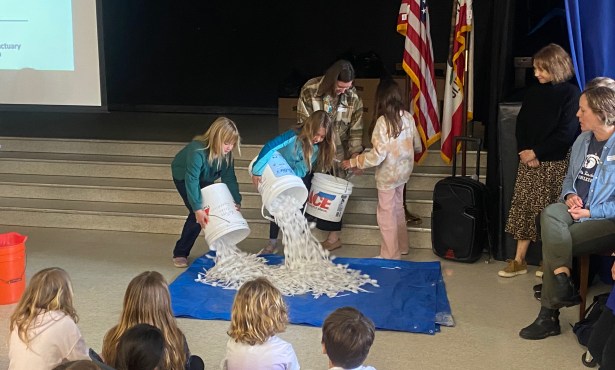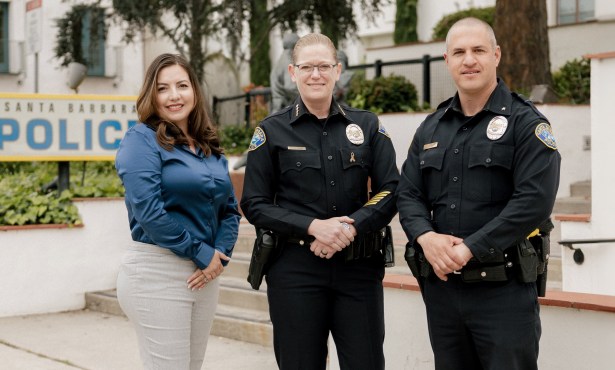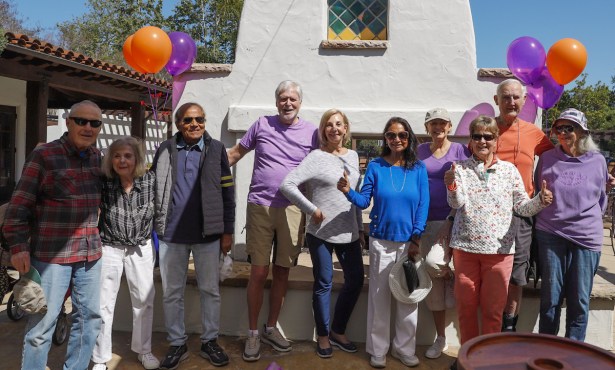Talking Torture at UCSB
Stuart Taylor and Scott Horton Debate America's Laws and Position on the Issue
The February 19 debate between columnist Stuart Taylor and human-rights advocate Scott Horton was the eighth round of the Arthur N. Rupe Great Debate Series. People flocked to UCSB’s Campbell Hall to watch Taylor and Horton explore the question of “Torture and the Law: Can U.S. officials be held accountable?” Moderator Lisa Hajjar presided over the discussion, and quipped that the debate did indeed satisfy Arthur Rupe’s “desire to see some fireworks.”
Both Horton and Taylor agreed that the government should launch a criminal investigation into the issue of torture, but diverged on the issue of assigning responsibility. They also disagreed on the specifics of the criminal investigation that both deemed necessary.
Horton kicked off the debate by drawing a parallel between our government and the king of Brobdingnag in Jonathan Swift’s Gulliver’s Travels. “Gulliver visits the king of this paradisiacal island kingdom and the king tells him that he values lawyers very much – he values them based on their usefulness. He says, ‘The best lawyers are those who can show that black is white,'” explained Horton. “His kingdom is ruled by man and not by law. The point he’s making has a lot to do with the problem we face today: What do we do with a government that twists the words and purposes of the law beyond recognition, establishing the principle that it is a government of men and not of laws?”
Horton charged the Bush administration with waging a war not on terror, but on the law and our understanding of the law. He emphasized the country’s urgent need to hold U.S. officials accountable for condoning and commanding the use of torture to obtain information from detainees. Horton suggested that because our judicial system operates according to precedents, illegal government action can slip through the cracks, undermining our democracy and our right to justice. Horton argued that the prosecutor assigned to the torture cases should have no connections to the Bush administration, but should be someone “above the political fray but also someone who has stature to act forcefully and credibly with society.”
Taylor countered that appointing a special prosecutor would be an unnecessary and counterproductive effort. “History teaches us that special counsels tend to end in leading political vendettas because of the dynamics of that sort of appointment and the publicity that attends it,” he said. He accused Horton of lacking trust in the Obama administration because of his desire for the government to appoint a prosecutor from outside the system.
Horton answered that while it’s important to consider the specifics of the investigation, a hang-up does not “constitute a reason to put on a blindfold” to the government’s offenses, he said.
While Taylor purported to agree that the government should launch a criminal investigation against those affiliated with the practice of torture, he also argued that “a great big gigantic investigation of Bush misdeeds” would divide the country and would inevitably turn into some kind of “partisan witch-hunt,” he said. Taylor alleged that there’s no evidence that high-level officials acted with criminal intent and that there’s a difference between “dumb” policies and criminal activity. He argued that these were officials who acted according to their civic duty to protect the country and its people, and for no other reason.
“They were not doing this out of sadism or to punish people or to please their weird desires,” Taylor said. “They were doing it because they were desperately afraid.”
Things got heated when Taylor made the comment that an indictment of officials like Bush, Cheney, Rumsfeld, Powell, and Rice “would be one of the most grotesque injustices in the history of the United States.” The audience cheered at the mention of prosecuting said officials, and Horton compared a refusal to prosecute top officials to the “behavior of a three-year-old,” he said. Horton argued that the government’s choice to refrain from prosecuting high-level officials reveals the weaknesses in our judicial system. To pin all the responsibility on the “little guys” – the military personnel who actually inflicted the torture – is to avoid the problem. To prosecute only at lower levels, he said, is to perpetuate an institutionalized bias that favors the rich and powerful.
Taylor stuck to his claim that the evidence to prosecute top-level officials just doesn’t exist, and said he’d “rather be waterboarded” than watch unfounded allegations destroy the reputations of “some fine people” in the government.
On the issue of torture itself, the debaters were at odds. Taylor argued that sometimes it’s the only way to obtain “life-saving truth,” while Horton countered that “beating the guy, in fact, isn’t going to be the most efficient way to get the truth.”
But both Horton and Taylor agree with John McCain, that “this is a definitional issue for us today.” Both would like for the end result to be a just result. This is a sensitive issue that will undoubtedly be difficult for the Obama administration to resolve, and both Horton and Taylor stress the need for our country to overcome partisanship and to continue to fight for truth and the preservation of our democracy.



